Charles E W Bean, Diaries, AWM38 3DRL 606/268/1 - 1917 - 1936 - Part 10
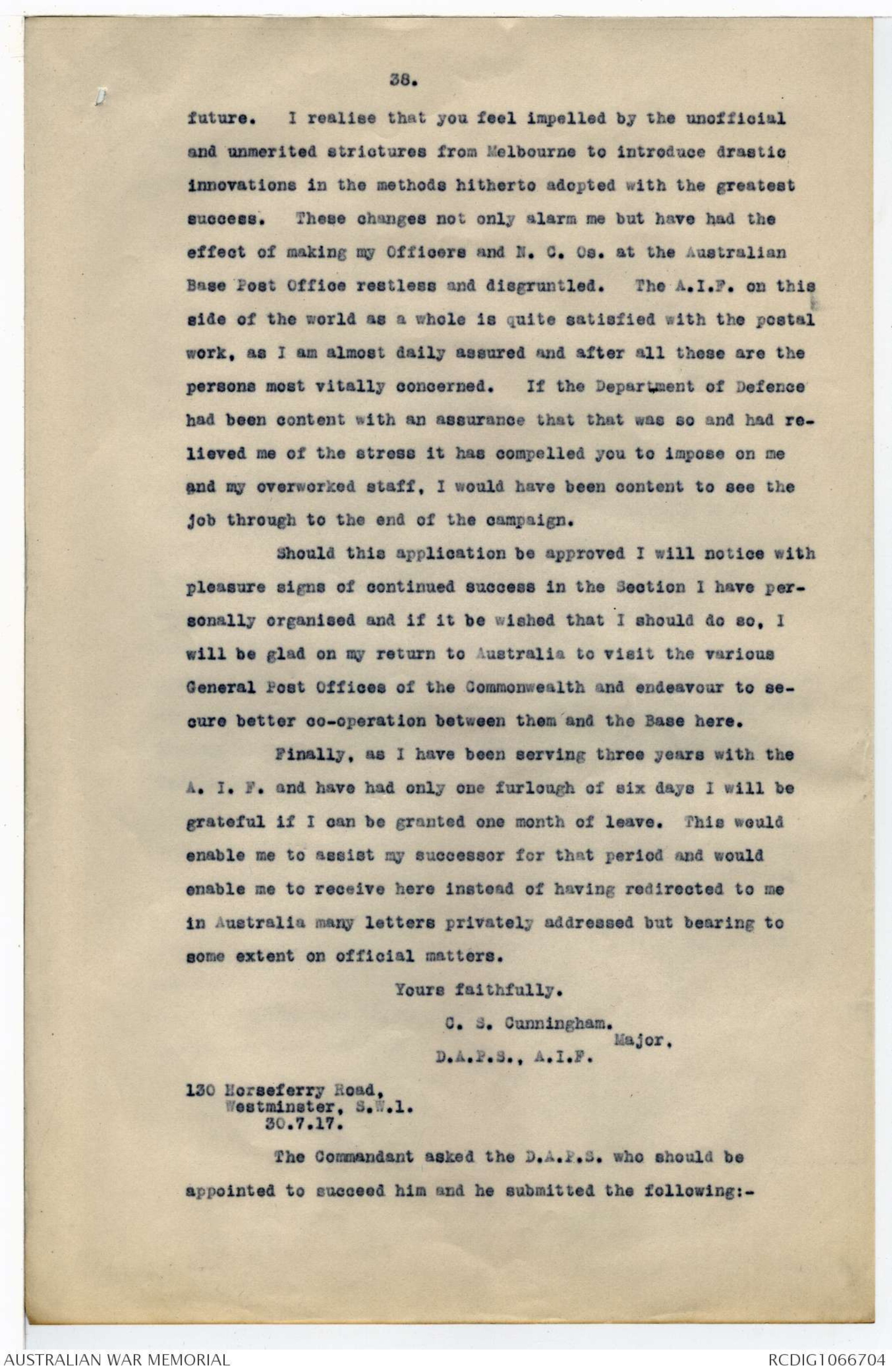
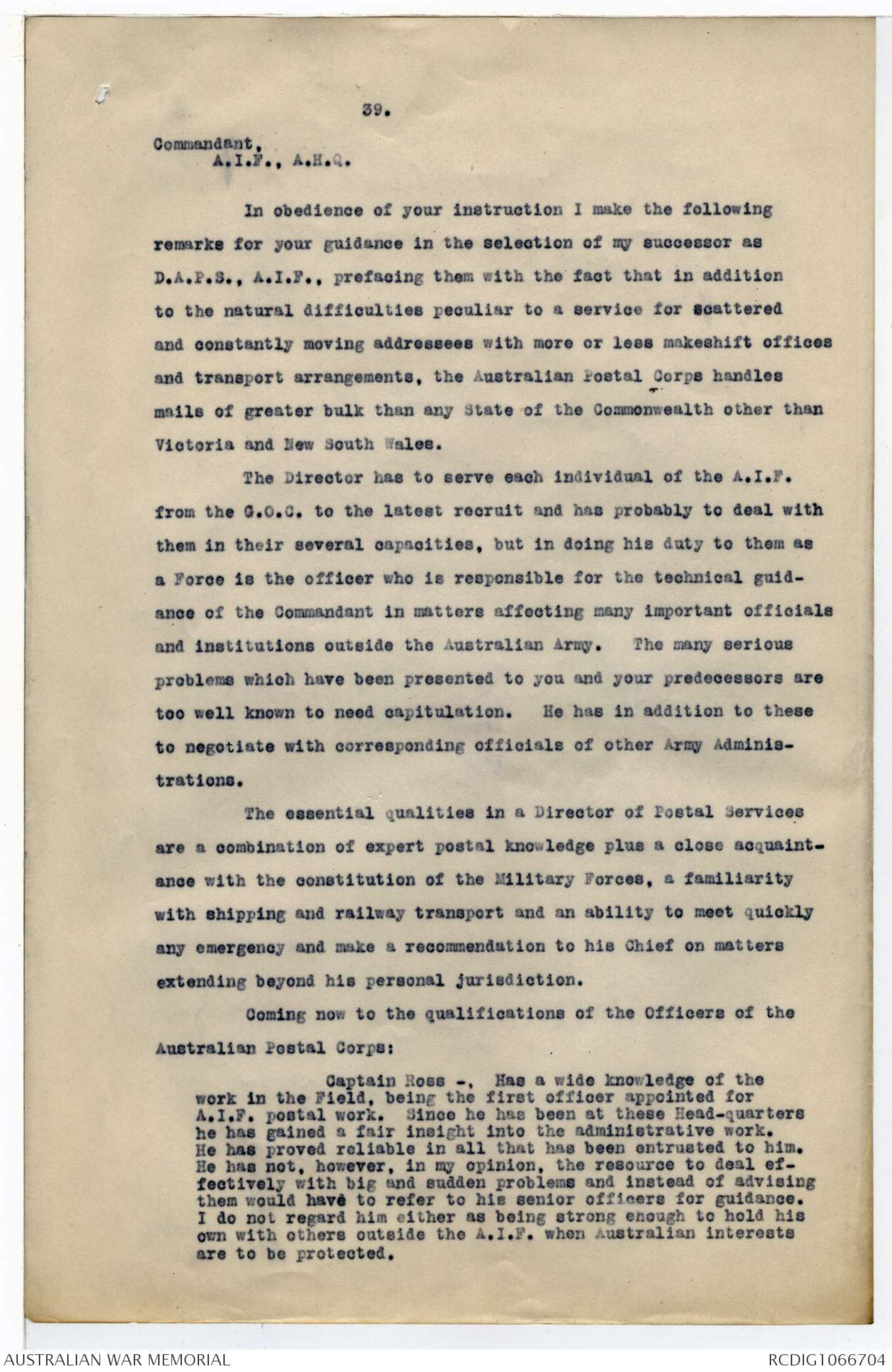
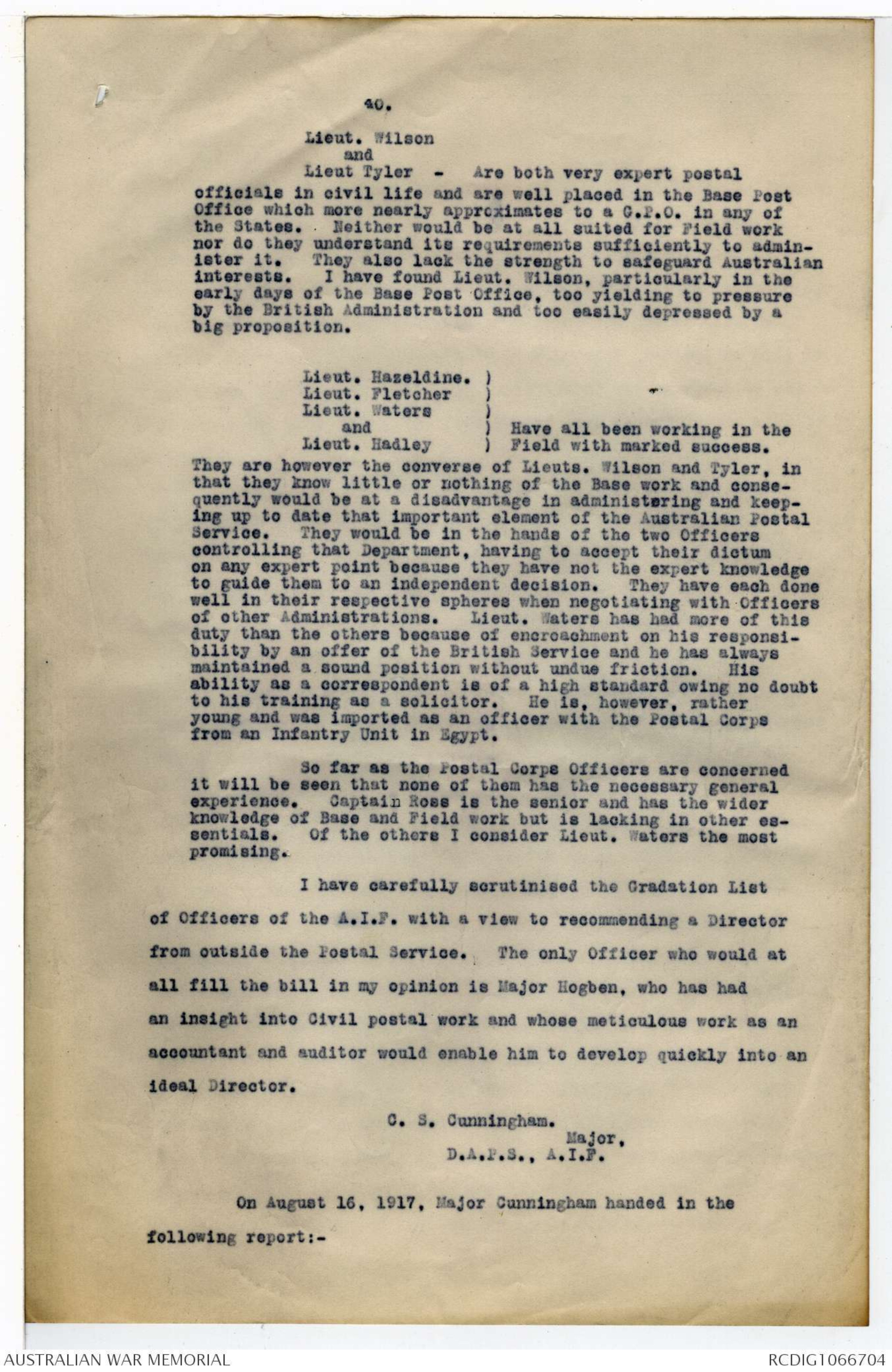
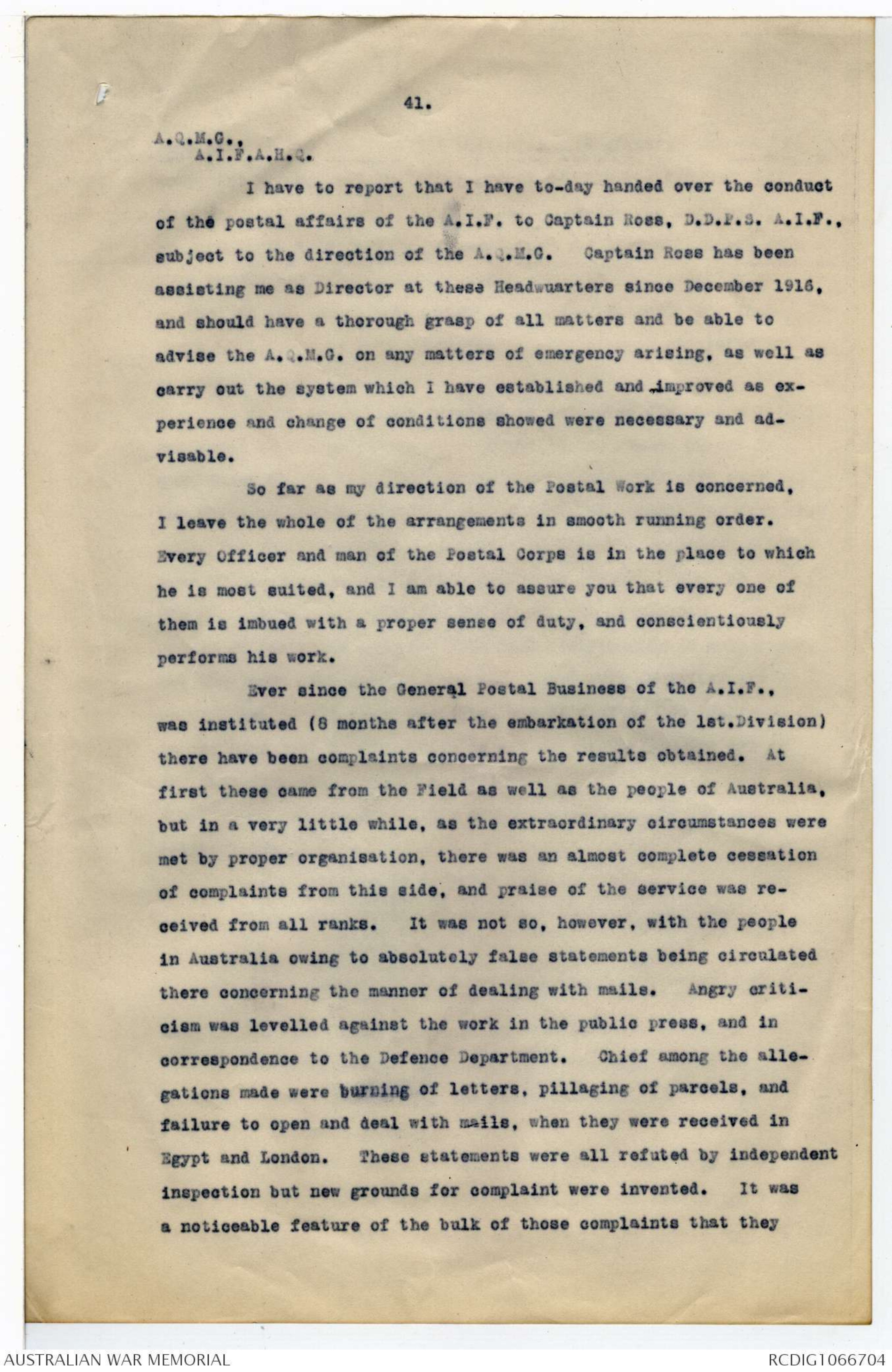
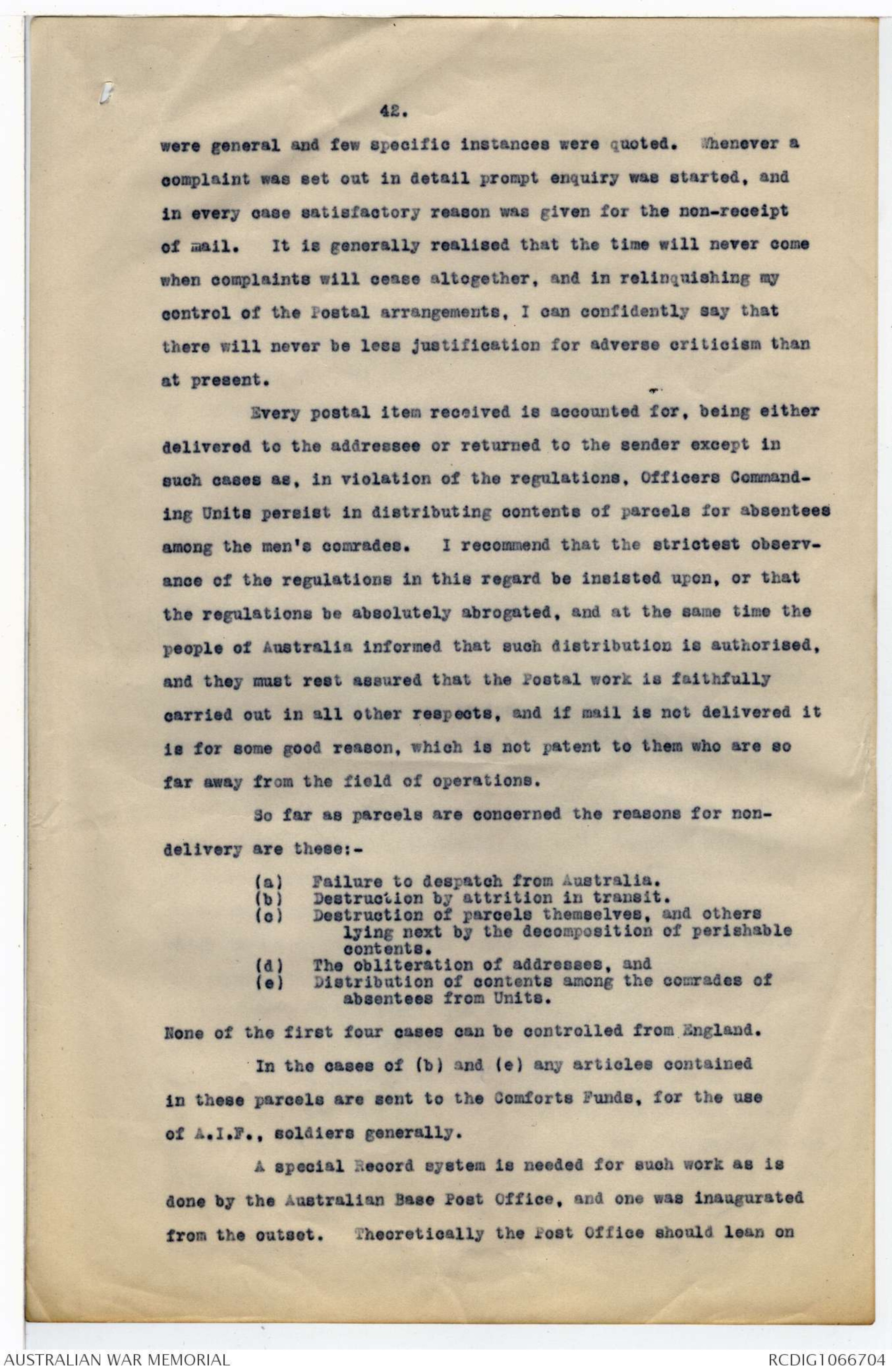
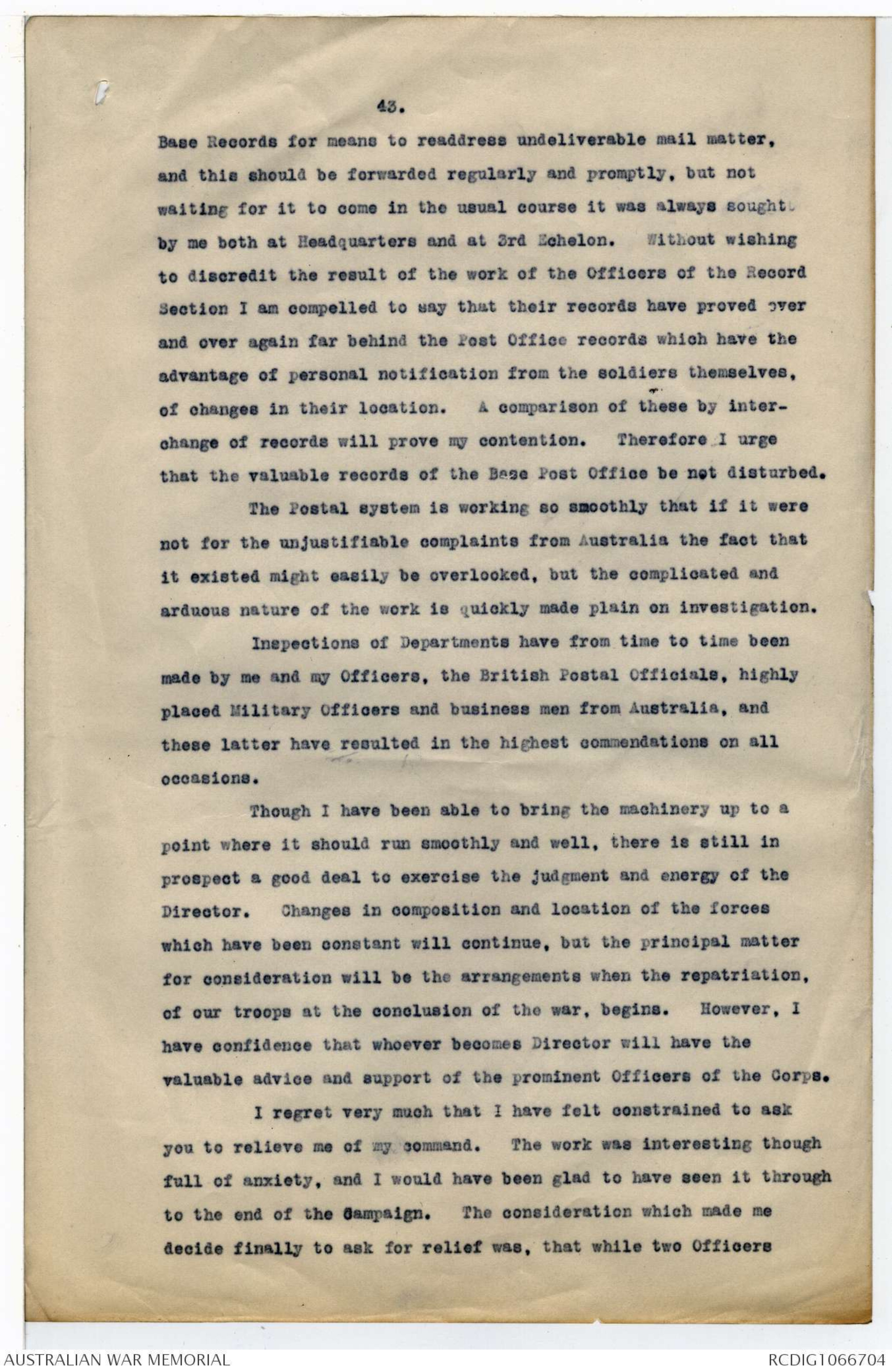
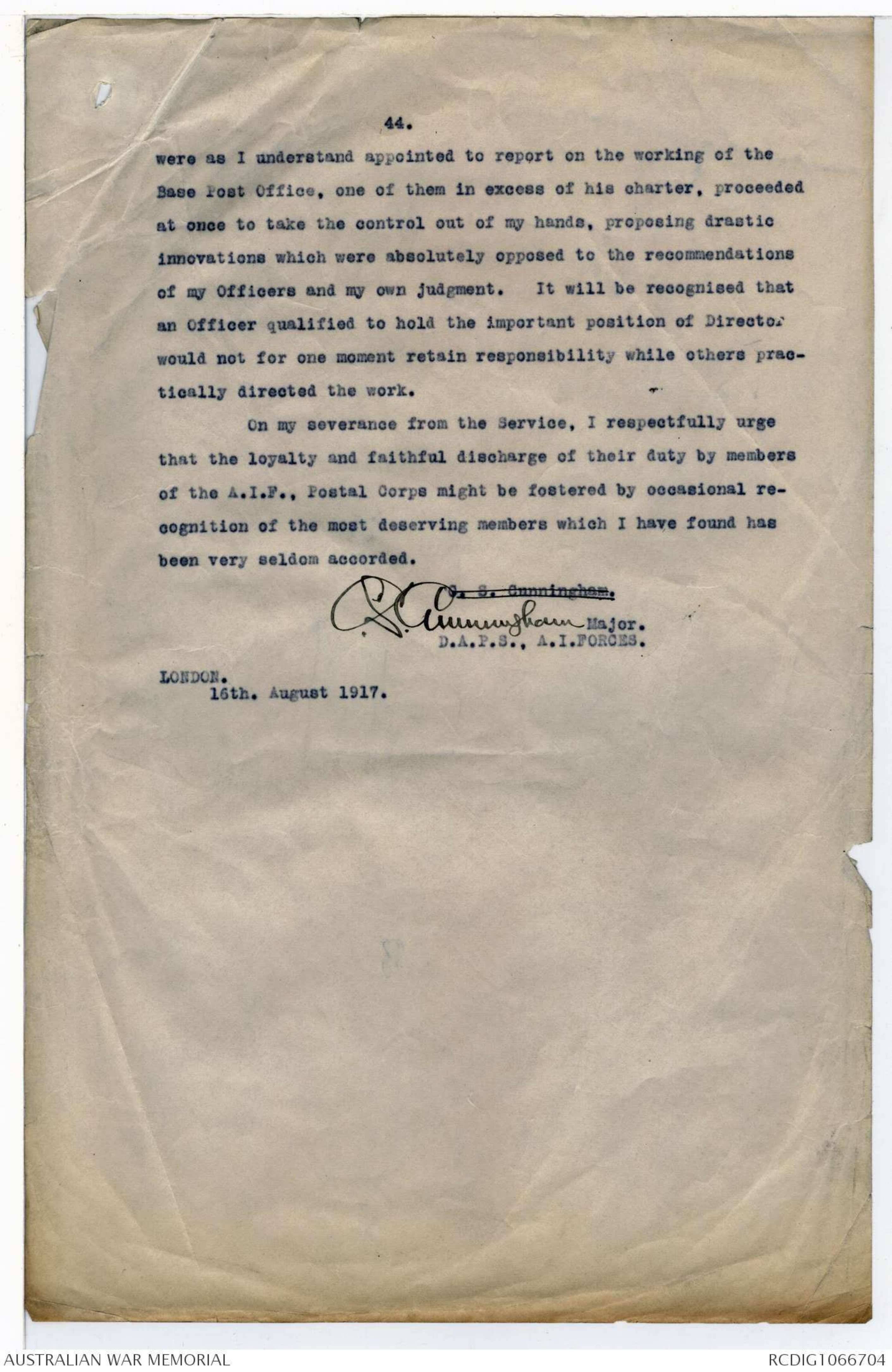
38
future. I realise that you feel impelled by the unofficial
and unmerited strictures from Melbourne to introduce drastic
innovations in the methods hitherto adopted with the greatest
success. These changes not only alarm me but have had the
effect of making my Officers and N. C. Os. at the Australian
Base Post Office restless and disgruntled. The A.I.F. on this
side of the world as a whole is quite satisfied with the postal
work, as I am almost daily assured and after all these are the
persons most vitally concerned. If the Department of Defence
had been content with an assurance that that was so and had
relieved me of the stress it has compelled you to impose on me
and my overworked staff, I would have been content to see the
job through to the end of the campaign.
Should this application be approved I will notice with
pleasure signs of continued success in the Section I have
personally organised and if it be wished that I should do so, I
will be glad on my return to Australia to visit the various
General Post Offices of the Commonwealth and endeavour to
secure better co-operation between them and the Base here.
Finally, as I have been serving three years with the
A. I. F. and have had only one furlough of six days I will be
grateful if I can be granted one month of leave. This would
enable me to assist my successor for that period and would
enable me to receive here instead of having redirected to me
in Australia many letters privately addressed but bearing to
some extent on official matters.
Yours faithfully.
C. S. Cunningham.
Major,
D.A.P.S., A.I.F.
130 Horseferry Road,
Westminster, S.W.1.
30.7.17.
The Commandant asked the D.A.P.S. who should be
appointed to succeed him and he submitted the following:-
39
Commandant
A.I.F.. A.H.Q.
In obedience of your instruction I make the following
remarks for your guidance in the selection of my successor as
D.A.P.S., A.I.F., prefacing them with the fact that in addition
to the natural difficulties peculiar to a service for scattered
and constantly moving addressees with more or less makeshift offices
and transport arrangements, the Australian Postal Corps handles
mails of greater bulk than any State of the Commonwealth other than
Victoria and new South Wales.
The Director has to serve each individual of the A.I.F.
from the G.O.C. to the latest recruit and has probably to deal with
them in their several capacities, but in doing his duty to them as
a Force is the officer who is responsible for the technical guidance of the Commandant in matters affecting many important officials
and institutions outside the Australian Army. The many serious
problems which have been presented to you and your predecessors are
too well known to need capitulation. He has in addition to these
to negotiate with corresponding officials of other Army
Administrations.
The essential qualities in a Director of Postal Services
are a combination of expert postal knowledge plus a close acquaintance
with the constitution of the Military Forces, a familiarity
with shipping and railway transport and an ability to meet quickly
any emergency and make a recommendation to his Chief on matters
extending beyond his personal jurisdiction.
Coming now to the qualifications of the Officers of the
Australian Postal Corps:
Captain Ross -. Has a wide knowledge of the
work in the Field, being the first officer appointed for
A.I.F. postal work. Since he has been at these Head-quarters
he has gained a fair insight into the administrative work.
He has proved reliable in all that has been entrusted to him.
He has not, however, in my opinion, the resource to deal
effectively with big and sudden problems and instead of advising
them would have to refer to his senior officers for guidance.
I do not regard him either as being strong enough to hold his
own with others outside the A.I.F. when Australian interests
are to be protected.
40
Lieut. Wilson
and
Lieut Tyler - Are both very expert postal
officials in civil life and are well placed in the Base Post
Office which more nearly approximates to a G.P.O. in any of
the States. Neither would be at all suited for Field work
nor do they understand its requirements sufficiently to administer
it. They also lack the strength to safeguard Australian
interests. I have found Lieut. Wilson, particularly in the
early days of the Base Post Office, too yielding to pressure
by the British Administration and too easily depressed by a
big proposition.
Lieut. Hazeldine. )
Lieut. Fletcher )
Lieut. Waters )
and ) Have all been working in the
Lieut. Hadley ) Field with marked success.
They are however the converse of Lieuts. Wilson and Tyler, in
that they know little or nothing of the Base work and consequently
would be at a disadvantage in administering and keeping
up to date that important element of the Australian Postal
Service. They would be in the hands of the two Officers
controlling that Department, having to accept their dictum
on any expert point because they have not the expert knowledge
to guide them to an independent decision. They have each done
well in their respective spheres when negotiating with Officers
of other Administrations. Lieut. Waters has had more of this
duty than the others because of encroachment on his responsibility
by an offer of the British Service and he has always
maintained a sound position without undue friction. His
ability as a correspondent is of a high standard owing no doubt
to his training as a solicitor. He is, however, rather
young and was imported as an officer with the Postal Corps
from an Infantry Unit in Egypt.
So far as the Postal Corps Officers are concerned
it will be seen that none of them has the necessary general
experience. Captain Ross is the senior and has the wider
knowledge of Base and Field work but is lacking in other essentials.
Of the others I consider Lieut. Waters the most
promising.
I have carefully scrutinised the Gradation List
of Officers of the A.I.F. with a view to recommending a Director
from outside the Postal Service. The only Officer who would at
all fill the bill in my opinion is Major Hogben, who has had
an insight into Civil postal work and whose meticulous work as an
accountant and auditor would enable him to develop quickly into an
ideal Director.
C. S. Cunningham.
Major,
D.A.T.S.. A.I.F.
On August 16, 1917, Major Cunningham handed in the
following report:-
41
A.Q.M.G..
A.I.F.A.H.Q.
I have to report that I have to-day handed over the conduct
of the postal affairs of the A.I.F. to Captain Ross, D.D.F.S. A.I.F.,
subject to the direction of the A.Q.M.G. Captain Ross has been
assisting me as Director at these Headquarters since December 1916,
and should have a thorough grasp of all matters and be able to
advise the A.Q.M.G. on any matters of emergency arising, as well as
carry out the system which I have established and improved as
experience and change of conditions showed were necessary and advisable.
So far as my direction of the Postal Work is concerned,
I leave the whole of the arrangements in smooth running order.
Every Officer and man of the Postal Corps is in the place to which
he is most suited, and I am able to assure you that every one of
them is imbued with a proper sense of duty, and conscientiously
performs his work.
Ever since the General Postal Business of the A.I.F.,
was instituted (8 months after the embarkation of the lst.Division)
there have been complaints concerning the results obtained. At
first these came from the Field as well as the people of Australia,
but in a very little while, as the extraordinary circumstances were
met by proper organisation, there was an almost complete cessation
of complaints from this side, and praise of the service was
received from all ranks. It was not so, however, with the people
in Australia owing to absolutely false statements being circulated
there concerning the manner of dealing with mails. Angry criticism
was levelled against the work in the public press, and in
correspondence to the Defence Department. Chief among the
allegations made were burning of letters, pillaging of parcels, and
failure to open and deal with mails, when they were received in
Egypt and London. These statements were all refuted by independent
inspection but new grounds for complaint were invented. It was
a noticeable feature of the bulk of those complaints that they
42
were general and few specific instances were quoted. Whenever a
complaint was set out in detail prompt enquiry was started, and
in every case satisfactory reason was given for the non-receipt
of mail. It is generally realised that the time will never come
when complaints will cease altogether, and in relinquishing my
control of the Postal arrangements, I can confidently say that
there will never be less justification for adverse criticism than
at present.
Every postal item received is accounted for, being either
delivered to the addressee or returned to the sender except in
such cases as, in violation of the regulations, Officers Commanding
Units persist in distributing contents of parcels for absentees
among the men's comrades. I recommend that the strictest observance
of the regulations in this regard be insisted upon, or that
the regulations be absolutely abrogated, and at the same time the
people of Australia informed that such distribution is authorised,
and they must rest assured that the Postal work is faithfully
carried out in all other respects, and if mail is not delivered it
is for some good reason, which is not patent to them who are so
far away from the field of operations.
So far as parcels are concerned the reasons for non-
delivery are these:-
(a) Failure to despatch from Australia.
(b) Destruction by attrition in transit.
(c) Destruction of parcels themselves, and others
lying next by the decomposition of perishable
contents.
(d) The obliteration of addresses, and
(e) Distribution of contents among the comrades of
absentees from Units.
None of the first four cases can be controlled from England.
In the cases of (b) and (e) any articles contained
in these parcels are sent to the Comforts Funds, for the use
of A.I.F., soldiers generally.
A special Record system is needed for such work as is
done by the Australian Base Post Office, and one was inaugurated
from the outset. Theoretically the Post Office should lean on
43
Base Records for means to readdress undeliverable mail matter,
and this should be forwarded regularly and promptly, but not
waiting for it to come in the usual course it was always sought.
by me both at Headquarters and at 3rd Echelon. Without wishing
to discredit the result of the work of the Officers of the Record
Section I am compelled to say that their records have proved over
and over again far behind the Post Office records which have the
advantage of personal notification from the soldiers themselves,
of changes in their location. A comparison of these by inter-
change of records will prove my contention. Therefore I urge
that the valuable records of the Base Post Office be not disturbed.
The Postal system is working so smoothly that if it were
not for the unjustifiable complaints from Australia the fact that
it existed might easily be overlooked, but the complicated and
arduous nature of the work is quickly made plain on investigation.
Inspections of Departments have from time to time been
made by me and my Officers, the British Postal Officials, highly
placed Military Officers and business men from Australia, and
these latter have resulted in the highest commendations on all
occasions.
Though I have been able to bring the machinery up to a
point where it should run smoothly and well, there is still in
prospect a good deal to exercise the judgment and energy of the
Director. Changes in composition and location of the forces
which have been constant will continue, but the principal matter
for consideration will be the arrangements when the repatriation,
of our troops at the conclusion of the war, begins. However, I
have confidence that whoever becomes Director will have the
valuable advice and support of the prominent Officers of the Corps.
I regret very much that I have felt constrained to ask
you to relieve me of my command. The work was interesting though
full of anxiety, and I would have been glad to have seen it through
to the end of the Campaign. The consideration which made me
decide finally to ask for relief was, that while two Officers
44
were as I understand appointed to report on the working of the
Base Post Office, one of them in excess of his charter, proceeded
at once to take the control out of my hands, proposing drastic
innovations which were absolutely opposed to the recommendations
of my Officers and my own judgment. It will be recognised that
an Officer qualified to hold the important position of Director
would not for one moment retain responsibility while others
practically directed the work.
On my severance from the Service, I respectfully urge
that the loyalty and faithful discharge of their duty by members
of the A.I.F., Postal Corps might be fostered by occasional
recognition of the most deserving members which I have found has
been very seldom accorded.
C. S. Cunninghame
C. S. Cunninhame Major
D.A.P.S., A.I.FORCES.
LONDON
16th. August 1917.
 Sam scott
Sam scottThis transcription item is now locked to you for editing. To release the lock either Save your changes or Cancel.
This lock will be automatically released after 60 minutes of inactivity.